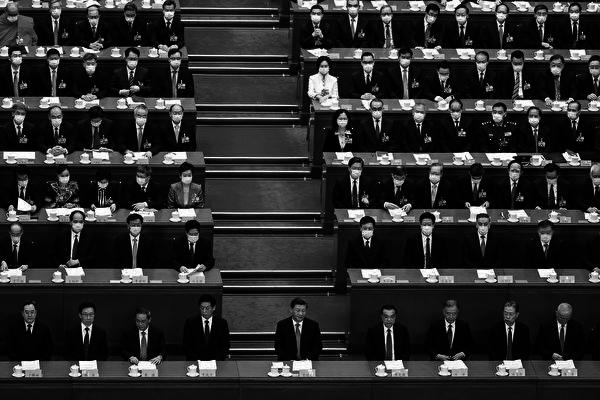File photo: On March 5, 2021, the day before the opening of China‘s National People‘s Congress (NPC), police patrol Tiananmen Square with dogs on a day of heavy air pollution in Beijing. (Photo by Kevin Frayer/Getty Images.)
[People News] On July 24, a China-EU summit commemorating the 50th anniversary of diplomatic relations between the European Union and China was held in Beijing. While China called on the EU to make a “correct strategic choice,” the EU urged a necessary rebalancing of bilateral trade relations. Aside from a joint statement on climate change, the summit produced no substantial progress in stabilising or advancing China-EU relations—highlighting the deeper contradiction between Xi Jinping’s rule and the interests of private enterprises and the nation as a whole.
1. The CCP’s Arrogance Toward the EU, Empty Diplomatic Rhetoric
According to Xinhua News Agency, Xi Jinping told EU leaders António Costa and Ursula von der Leyen that China-EU relations are once again at a “critical historical juncture” and that both sides must make “correct strategic choices.” He added that “Europe’s current challenges do not come from China.”
Von der Leyen, however, responded candidly, stating that China-EU relations have reached an “inflexion point” and that “rebalancing” the relationship is crucial.
Despite repeated signals from the EU to repair the relationship, the Chinese side ignored them, continued unilateral messaging, and dismissed EU concerns about China’s ties with Russia.
2. Xi Jinping’s Hardline Stance Ignores the Survival of Private Enterprises
Publicly available data shows:
In 2024, the EU imported €517.8 billion worth of goods from China, accounting for 21.3% of total EU imports, making China one of the EU’s top trade partners.
According to China’s General Administration of Customs and Ministry of Commerce, China’s exports to the EU in 2024 included smart devices, integrated circuits, new energy vehicles, and solar equipment. Among these, private enterprises accounted for 64.5% of export volume, while state-owned enterprises (SOEs) made up only 15.2%. That’s 4.24 times more private sector exports than SOEs.
Clearly, stable China-EU relations are far more beneficial to private firms. Yet when the EU pushed for a restructuring of the relationship, Xi showed no concern for the private sector—instead, his tough stance blatantly disregarded their survival.
3. Private Enterprises Are the Main Engine for Chinese Employment
According to Central News Agency (Taiwan), between 2019 and 2023, China’s unemployment rate rose from 11.2% to 21.3%. While recent official data suspiciously revised the unemployment rate to zero, this cannot conceal the severity of the employment crisis.
In 2023, the CCP issued a document titled “Fully Leverage the Role of Private Enterprises as an Employment Reservoir,” acknowledging Xi Jinping’s own statement that private businesses are the main force in absorbing labour, contributing to over 80% of urban employment. Yet, when it comes time to protect private-sector trade and ensure jobs, Xi has made the exact opposite choice.
China’s manufacturing sector may be its global signature, but it owes its strength largely to private firms. Even though these companies are crucial to solving employment problems, they are not part of the CCP’s core policy calculus. Xi’s frequent use of slogans like “meeting the people's expectations” is purely rhetorical—the people, in truth, hold no place in his agenda.
4. China-EU Tensions Are Simply the Result of Xi’s Autocracy
The main source of the China-EU conflict lies in Xi Jinping’s support for Russia during its war against Ukraine. But under Xi’s increasingly authoritarian rule, this support is unlikely to stop—in fact, it will likely intensify.
Xi’s continued alignment with Russia isn’t because Russia is a good partner, but because even a “crippled ally” like Russia offers Xi strategic value: Russia serves as a buffer against the U.S. and democratic influence. It acts as an energy supplier and a grey-market economic partner. Most critically, Xi fears that if Russia collapses, China will be next in the international spotlight.
5. Xi’s Obsession With Power Is the Root of All Conflict
Will the U.S. take down the CCP? After the CCP established the PRC in 1949, Mao Zedong immediately implemented dictatorship, and in 1950, he ordered troops to fight U.S. forces in the Korean War. One would expect long-standing hostility between the two nations. Yet, the U.S. did not attempt to topple the regime. In fact, in 1972, during the height of Mao’s Cultural Revolution, the U.S. initiated a visit to China, paving the way for economic reforms.
During a recent European visit, Wang Yi inadvertently admitted: “China doesn’t want to see Russia fail in the war in Ukraine, because that might shift America’s full attention to China.” This statement reflects Xi Jinping’s personal fear—that his unilateral decisions have put his autocratic rule at risk.
The CCP’s massive bureaucratic system depends on a functioning economy for its survival. Confrontation with the West goes against the interests of most officials. Today, Xi Jinping alone is entangled with Russia, and he alone is escalating tensions with the West. He refuses to admit his mistake in backing Russia, nor can he bear the blame for crippling China’s economy. So instead, he ties his personal misjudgments to the Party and national interests, clinging desperately to Russia, hoping to fend off a nonexistent Western threat.
In the past, Xi could trade political appointments for loyalty, but now his grip on power is in question, and loyalty bought with benefits is proving unreliable. It is foreseeable that Xi Jinping will become a public scapegoat, facing mounting blame from all sides, and will ultimately fall into political ruin.
(First published by People News)









News magazine bootstrap themes!
I like this themes, fast loading and look profesional
Thank you Carlos!
You're welcome!
Please support me with give positive rating!
Yes Sure!